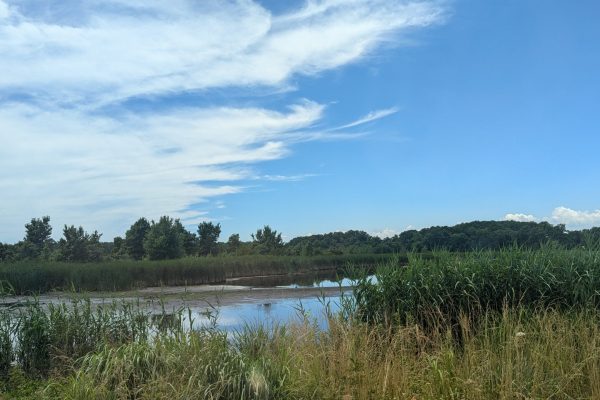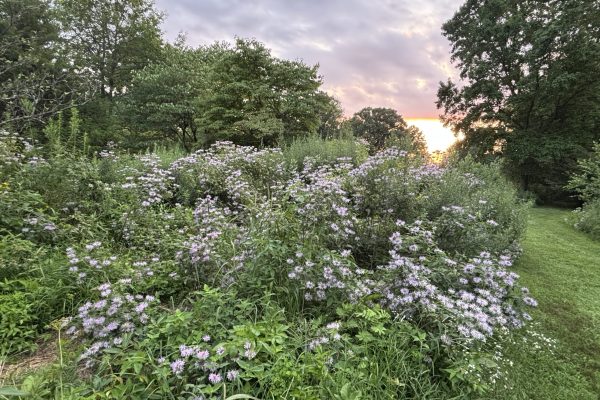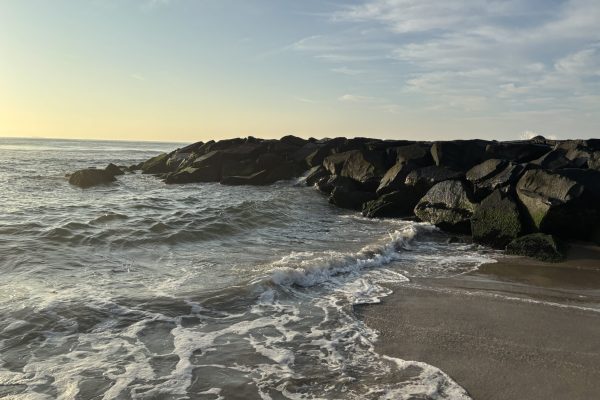Ecological grief, or in particular climate grief, refers to the sense of loss that arises from experiencing or learning about environmental destruction or climate change. In this time of constant change and ecological devastation, this loss is non-finite, ongoing. The work of tending to our personal and collective grief is therefore continuous and non-linear. This ritual is designed to be supportive to the constant process of caring for our collective climate grief. It is intended to be revisited, revised and performed in community or with a hevruta, a learning partner.
The Jewish ritual of tevillah, immersion, in a mikveh, a ritual bath, containing mayim hayim, fresh, running water, is an ancient and sacred practice. Any natural body of water–a river, lake, stream, ocean or sea, can serve as a mikveh. In our tradition, mikveh is a locus of sacred transformation. Water is life; our estuaries and watersheds shape our landscape and support our essential functions. Mayim hayim constitute a portal, facilitating the easeful transformation between different states of being, sanctifying transitions. This Wild Mikveh will honor our climate grief and facilitate our transition into meaningful collective action.
Ritual:
Choose your mikveh
Choose your natural body of water to immerse in. It can be near or far, but it should be a body of water you have a relationship with. Bring a hevruta, or a collective of beloveds, to come immerse with you. You will guide each other through the ritual.
Prepare your body for tevillah
Jewish wisdom teaches that there must be no barrier between the body and the mayim hayim. Ecological destruction is in part caused by the false separation between self and the environment. Part of our collective healing must be the reintegration of self and environment, the deep understanding that our wellbeing is entangled with the wellbeing of all creatures; with the wilds. Remove all barriers between yourself and the living waters, including clothing, jewelry, and nail polish.
Enter the water
Have your hevruta read this kavanah:
Akiva was a shepherd of 40 years old. One day, while standing by the mouth of a well in Lydda, he inquired, “Who hollowed out this stone?” and was told, “Akiva, haven’t you read that ‘water wears away stone’ (Job 14:19)? – it was water falling upon it constantly, day after day.” So, Akiva asked himself: “Is my mind harder than this stone? I will go and study at least one section of Torah.” We know this man as the legendary Rabbi Akiva.
The softness of water has the power to carve and shape the hardness of stone, through steadiness and persistence.
Repeat after your hevruta: May the softness of the water flow over me; may it soften my grief and carve a space for hope in my heart. May the softness of the water welcome my grief and hold it for me.
Bless this mitzvah
It is Sephardic Jewish custom to bless the mitzvah of immersion before immersing in the mikveh. Take a moment to connect your breath and center gratitude for this sacred ritual.
Bless:
Barukh ata Adonai, Elohenu melekh ha’olam, asher kideshanu b’mitzvotav v’tzivanu al ha’tevillah.
Blessed are You, Adonai, our God, Eternal Sovereign, who has sanctified us with Your commandments and commanded us to immerse.
בּרוּךְ אַתָּה י’ אֱלהֵינוּ מֶלֶךְ הָעוֹלָם אֲשֶׁר קִדְשָׁנוּ בּמִצְוֹתָיו וְצִוָנוּ עַל הַטְבִילָה
Immerse
Immerse yourself fully each time. Your hevruta will read a kavannah (guiding intention) before each dunk and then declare each immersion “kosher,” ensuring there is no separation between body and sacred water. The kavannot are based on Joanna Macy’s “Work that Reconnects.” Go slowly, and deepen into the emotions that arise.
First immersion: Coming From Gratitude
Kavannah: Modeh ani l’fanecha, ruakh hai v’kayam. I am grateful to you, Living and Enduring Spirit, and I am grateful to the waters for supporting my lifeforce.
Second immersion: Honoring Our Pain for the World
Kavannah: I am grieving the loss of (name your grief). I give my grief to the water, knowing that it is big and generous enough to hold it for me.
Third immersion: Seeing with New/Ancient Eyes
Kavannah: My wellbeing is intertwined with the wellbeing of all creatures and our shared environments. As my skin meets the mayim hayim, I enter into sacred communion with the wilds, and assume my humble place in connection with all Life.
Fourth immersion: Going Forth
Kavannah: With this final immersion, I commit myself to the belief that a better world is possible because we can build it. I will take bold climate action with my beloved community to help ensure a livable future for all.
Closing
After everyone has completed their immersion and dried off, gather together to close the ritual. Havdalah, or separation, is our ritual technology for marking the transition out of sacred time, Shabbat, and into the mundanity of the week. The preliminary verses of the havdalah liturgy include “Ush’avtem mayim b’sasson mima’aynei hayeshua”: You will draw water in joy from the wells of Salvation. (Isaiah 12:3)
Climate action, in essence, is a practice of faith. These times require the courage to imagine that another world is possible, that we must build it. Together, sing Isaiah’s prophetic vision, the words that accompany us every Saturday night as we make havdalah:
מִמַּעַיְנֵ֖י הַיְשׁוּעָֽה
שְׁאַבְתֶּם מַ֖יִם בְּשָׂשׂ֑וֹן
Mimainei hayeshua
Shavtem mayim b’sason
We will draw water in celebration
From the wellsprings of liberation
Mayim Chayim
מים חיים
As we move forward from the sacred intensity of this ritual, we take with us our grief, and our commitment to collective climate action.











